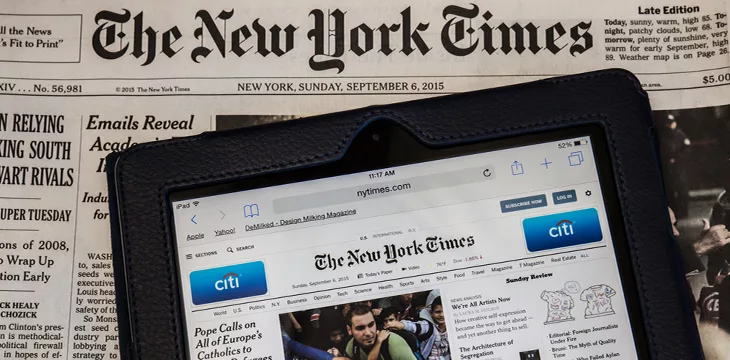OpenAI, the maker of ChatGPT, the market leader in artificial intelligence (AI) chatbots, has filed a motion with the New York Times (NASDAQ: NYT) to dismiss some of the charges against the company.
The motion, filed in the Southern District of New York, takes aim at some of the NYT’s copyright infringement claims, arguing that many do not object to current digital copyright laws.
OpenAI claims the NYT “paid someone to hack OpenAI products.” The paper added that it had made tens of thousands of attempts to manipulate ChatGPT to produce results that supported its claims. NYT also reportedly exploited a bug in ChatGPT that OpenAI is working to fix.
“Ordinary people don’t use OpenAI products in this way,” OpenAI said.
The legal battle between the Times and OpenAI began in December last year when the Times sued the AI startup for using copyrighted work. The NYT claimed that the startup used millions of articles to train large-scale language models (LLMs). Chatbots using these LLMs, including ChatGPT, now compete with the NYT as a trusted source of information.
ChatGPT also replicates some of the NYT articles it was trained on. By having newspaper articles exist behind a paywall, ChatGPT provides users with a workaround, denying the company a valuable revenue stream ($1.65 billion of the $2.4 billion the NYT generated last year came from subscriptions).
Ian Crosby, the NYT’s lead counsel, dismissed the hacking claims as an attempt by OpenAI to divert the court’s attention from the facts.
“What OpenAI oddly misrepresents as ‘hacking’ is simply using OpenAI’s products to find evidence that they have stolen and copied the Times’ copyrighted work. And that’s exactly what we found,” he said.
According to OpenAI’s motion, the NYT’s lawsuit relies on regurgitation and hallucinations. The first is when the AI model produces responses that are very similar to the data it was trained on, and the second is when it generates responses that are incorrect but look realistic. The company says it is working to eradicate both problems and that its products come with warnings that they face both problems.
OpenAI vs. the world
The fight between the two hinges on U.S. copyright law and how Manhattan courts will interpret it. OpenAI maintains fair use precedents that allow us to use copyrighted content in our technological processes to create new, innovative products. It also provides space for copying for scholarship, teaching and research purposes.
Copyright experts are divided over the legal battle. Some people point out that the law does not prohibit the use of copyrighted material for learning, and that this is exactly what LLM has been doing.
Author Dan Jeffries summary“Young quarterbacks don’t need permission from Tom Brady to study throwing motions to learn how to throw a football.”
Others, such as James Grimmelmann of Cornell University, point out that if an AI model can produce a NYT article verbatim, it is no longer protected by copyright freedom.
Additionally, this latitude only extends if the application is not commercially available.
OpenAI’s fight with the NYT is one of several it is facing over copyright infringement. This week, three digital outlets sued the company, including The Intercept, which is affiliated with Edward Snowden. Elon Musk, one of the company’s founders and early investor, also filed the lawsuit Thursday.
Watch: Cybersecurity Fundamentals for Today’s Digital Age with AI and Web3
Are you new to blockchain? To learn more about blockchain technology, check out CoinGeek’s Blockchain for Beginners section, our ultimate resource guide.


